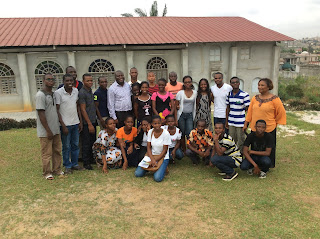Preaching the Gospel everywhere. All cultures matter to God.
The picture at Kouassiblekro village. Preaching the gospel among people of different cultures needs the capacity to adapt to another culture. It is a process of adjusting with patience and, in some cases, with culture shock. When these happen in the new communities, we start learning. When we compare our culture with the new one, we might be shocked, but when we allow the Holy Spirit to guide us in the process of entering the new culture, that will happen. Hierbert said, “God is not a tribal God, but the God of the world; that the gospel is for everyone; and that the church is one body that breaks down the walls of ethnicity, class, and nationalism that divide humans into warring camps.”
Missionaries should be Christians who are open-minded, who are able to accept people as they are. In doing so, they will have an opportunity to share the Gospel of Jesus Christ. Missionaries are called to love all people in their place of assignment.
It is important for missionaries to have knowledge in social sciences such as anthropology, sociology, psychology, and history. These sciences have tools to understand people and their culture better. Though I speak Kiswahili, my Kiswahili spoken in Congo is different from Kiswahili spoken in Kenya and Tanzania. While preaching in Kenya, I was using a translator to avoid any misunderstanding with the community. Hiebert says, “anthropology can provide us with many insights into such specific mission tasks as bible translation.” It also helps missionaries to understand the processes of conversion.
Missionary Francine sharing food in Alepe village. Love is the key to open a new community. A missionary must give love through words and good works while sharing the good news of Jesus Christ. Each culture has its values, norms, and customs which the missionary should learn and respect for him or her to be able to share the Gospel of Jesus Christ with the new community. When the missionary shows respect toward the values of the new community, it allows the community to accept him or her.
Living in a foreign country allows the missionary to learn humility and solidarity. A new community is a place where the missionary should learn to practice humility, respect, and listening to others. God is present in all the processes where the missionary is trying to adjust in the new community. God always sends people to the missionaries, so that they can advise and teach them. Living in a foreign country needs the attitude of a student who wants to learn, and that of a teacher who want to teach. If we listen to the local voice, God will give us the opportunity to find our entry point into the new community.
Elmer says, “The ways we are effective in culture are also the primary ways we serve others. We serve people be entering into relationship of love and mutual commitment. As the apostle Paul says, we loved you so much that we were delighted to share with you not only the gospel of God but our lives as well (1 Thess 2:8).
When missionaries felt the capacity to enter in relationship with local people, they will not have a chance to serve longtime on their place of assignment. When we develop an attitude of servanthood, we can work like Jesus who came in the human form to live among humans (Jn 1:14) and served in Jewish culture.
To serve in another culture, a missionary should behave humbly and avoid exhibiting superiority over others. Only by being humble can we connect with other people. When missionaries serve in a different cultural background, they should develop the attitude of welcoming people in their presence, communicating with respect with other people. They should learn to build relationships based on trust with local people. We are not just teaching others, but we also learn from others while serving. For instance, in my case, I have learned to mobilize local resources from my place of assignment, Cote d’Ivoire, to my supporting churches in the US. Mission field in another culture is an opportunity to serve Jesus and grow spiritually and socially.
It helps to form growing and deepening relationships with people and with God. Elmer says, “when God chose to connect with human, he did so as a servant.” While serving in a new culture, a missionary should be a servant like Jesus. In my experience as a missionary, I have developed the humility to work local leaders, to allow myself to grow and serve them.
If a missionary learns the local language, it will open the door for him or her to understand more about the community. Language is a powerful tool to share the Gospel and receive feedback. Ruffle says, “learning a new language calls for a sense of humor and good dose of self-deprecation.” This is just to insist the importance to learn the new language.
If you are willing to support missionaries, please visit our Global Ministries at www.umcmission.org and give it to advance #3021390 for Jean Claude or #3022068 for Francine. Our project advance is #3021990. Thank you.
Our Prayer requests:
Pray for our supports for us to continue on this journey.
Pray for evangelism and church planting ministry.
Pray for all our collaborators.
Pray for our Children (BERTHE AND EPHRAIM) for their studies. Pray for water for life ministry to have sponsors.
Pray for our health.
We are in need to raise friends to our vision as well as to raise funds to keep us serving in God’s mission. If you are willing to support us financially, send a check















